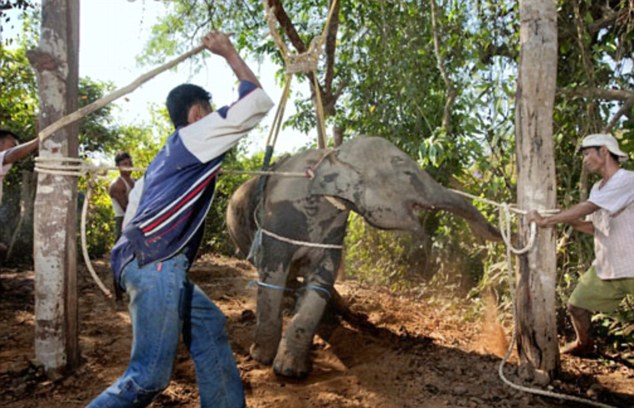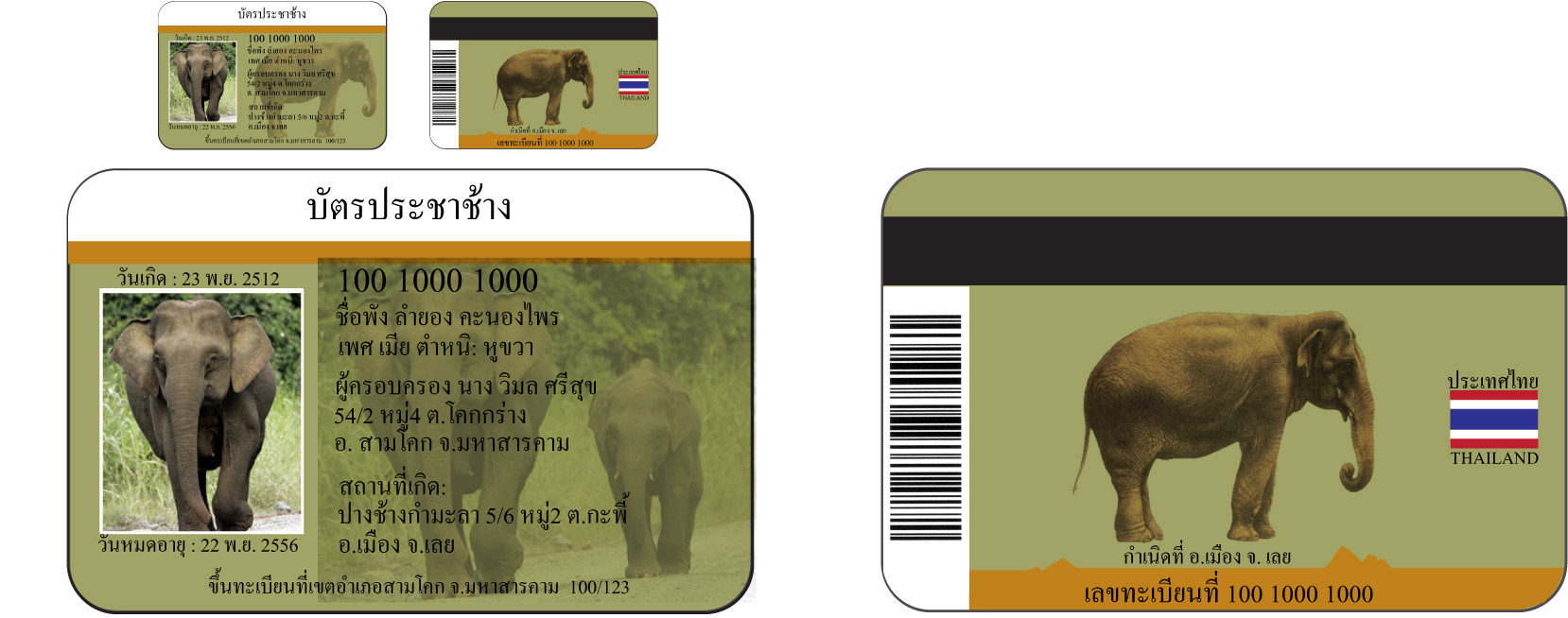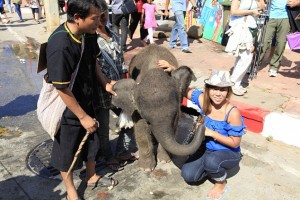Celebrating a whole year of Nam Chok. Still wearing her riding saddle on the day she was rescued, Nam Chok has now spent 365 days free of chains.
The Duchess Cornwall’s brother tells how baby elephants are brutally starved and tortured
Source: The Daily Mail
http://www.dailymail.co.uk/news/article-2176957/The-agonising-blows-expose-evil-secrets-Thailands-elephant-tourism-The-Duchess-Cornwalls-brother-tells-baby-elephants-brutally-starved-tortured.html?ito=feeds-newsxml
The agonising blows that expose the evil secrets of Thailand’s elephant tourism con: The Duchess of Cornwall’s brother tells how baby elephants are brutally starved and tortured
There are few things more adorable than a baby elephant.
Little more than 3ft tall and naturally curious, they are the undisputed stars of the scores of elephant camps created in the forests of Thailand to offer tourists the opportunity to get close to the world’s largest land animals.
For many of the 850,000 Britons who go on holiday to Thailand every year, a trip to an elephant park is an unmissable part of their trip.
While some are doing good work, the vast majority of elephant camps are commercial enterprises, making money from tourists keen to have their photos taken with the young ones, bathing with the elephants or riding them, or watching them paint.
Some camps even dress up their elephants and have them perform unnatural and demeaning tricks, all in the name of entertainment.
But beyond the happy smiles of tourists posing with elephants, there is a hidden dark reality, of murder, smuggling and torture for the calves on show.
The booming Thai tourist industry is fuelling a huge illegal trade in baby elephants that are taken from the wild in Burma, beaten, starved and tortured to break their spirit before being paraded in front of fee-paying holidaymakers.
The reports we have recently received indicate that at least 50 to 100 elephant calves are still being taken from the forests of Burma every year to supply the tourist camps.
Even worse, it is estimated that for every calf smuggled across the country’s 1,200-mile border with Thailand, up to five adult female and adolescent elephants from the calf’s immediate family group are gunned down in cold blood.
The forests of Burma are one of the last strongholds for Asian elephants and second only to India.
But such is the scale of the trade, it is thought that the endangered wild elephant population there – estimated at up to 5,000 individuals – could be wiped out or damaged beyond repair within ten years or so.
A decade ago, I helped launch a conservation charity, Elephant Family, in an effort to save the Asian elephant, which has lost up to 90 per cent of its population in the past 100 years.
While African elephants and ivory have dominated discussions on conservation, very little attention has been given to the Asian elephant.
The Asian elephant is facing extinction and is listed as ‘endangered’ on the International Union for Conservation of Nature (IUCN) Red List, the world’s most comprehensive inventory of the conservation status of species.
With an estimated 25,000 to 35,000 left in the wild, there is roughly one Asian elephant to every 20 African elephants.
Calves die from injury, stress or heartbreak
While ivory poaching has recently escalated to alarming levels again, threatening many African elephant populations, the crisis facing their Asian relatives is still being overlooked – something we’ve set out to change.
Despite what some are claiming, Elephant Family has recently received disturbing reports that the illegal and brutal cross-border trade in endangered wild Asian elephants continues to thrive.
And now we have collaborated with The Ecologist Film Unit and Link TV on a shocking new documentary film that lays the trade bare. Working with undercover operatives, the film includes interviews with elephant experts, undercover researchers and representatives of the Thai government.
It also includes harrowing clandestine footage of elephant calves being mistreated and tortured along the Thai-Burma border. Many of the people who were interviewed for the film and provided the undercover footage did so at great risk, and continue to put their lives on the line to fight this trade.
The film tells the story of the trade – illegal in both Burma and Thailand – in elephants from the remote and mountainous forests that straddle the Thai border. Entire families of elephants are routinely being rounded up and the adults shot dead so that babies can be dragged back to Thailand illegally.
Elephant ID smart-cards as introduced and supported by WFFT
Undercover cameras filmed the elephants as they endured the dreaded phajaan, a cruel, spirit-breaking ritual where the baby calves will be tied up, with no food and water, and beaten relentlessly for days on end. It is pure torture and according to experts we spoke to, very often the calves will die from their injuries or from stress, starvation or the sheer heartbreak of seeing their family killed in front of their eyes.
After they have been taught to be afraid of humans, the calves that do survive are smuggled across Thailand. When they reach the tourist elephant parks, many of them will be chained to a surrogate mother in an attempt to suggest they have been bred in captivity.
Telltale signs can be a complete lack of bonding between ‘mother’ and calf, the inability of a calf to suckle (because the ‘mother’ is not actually producing milk), as well as the scars from their horrific training.
Some camps even try to present unrelated calves as elephant twins alongside their bogus mother. This is almost always a double deception as elephant twins are incredibly rare.
The current market price for a healthy broken-in baby elephant is £14,000 to £20,000 and with the rapid growth of tourism and demand for elephants in entertainment – we calculate the tourism industry in Thailand employs up to 2,000 elephants – there are strong incentives for the trade.
As Burma increasingly opens up to the rest of the world, there are fears that the growth of the tourist industry there could be disastrous for the country’s remaining wild elephants.
A ‘broken-in’ baby can be worth £20,000
[vsw id=”HRCZPfZfs00″ source=”youtube” width=”425″ height=”344″ autoplay=”no”]
The Thai government is eager to claim it has solved the problem, but the intelligence, testimonies and images included in the film and shot in recent months overwhelmingly suggest that the trade still continues.
Earlier this year, Thai enforcement officials launched a nationwide crackdown on elephant camps in response to a series of poaching incidents. Unregistered (and therefore illegal, and potentially wild-caught) elephants were confiscated.
However, to have been truly effective, the checks should have been conducted on all captive elephant facilities with little or no warning, to prevent any unregistered elephants being moved.
Some of the checks were reported to have been unnecessarily heavy-handed, particularly on those facilities that had been critical of the government’s handling of poaching incidents and the trade in live elephants.
Our latest information suggests the increased enforcement activity has simply pushed the trade further underground. Traditional trade routes used to transport elephants have now changed and holding sites that are normally used have also been relocated.
Sources and informants reported in April and June this year that wild capture was still being widely conducted, but that calves are now being stockpiled on Burma’s border while traders wait for an opportunity to smuggle them into Thailand.
The lack of data on the live trade has been the foremost constraint in efforts to tackle it to date. While there are indications that it is increasing, its highly political and criminal nature have made the gathering of comprehensive data incredibly difficult, as has the recent crackdown.
Yet Elephant Family’s sources indicate that significant numbers of wild-caught elephants continue to enter Thailand from Burma. In the past year, 26 calves have been observed in just five sites along the border.
Over a similar time frame, a further 51 elephants either known to have come from the wild, or showing all the visual indicators to suggest that has been the case, have been recorded in Thai camps or being traded at the Surin elephant festival in November.
Elephant Family believes that these figures are just a fraction of the actual numbers. Conservation campaigners, including Elephant Family, are urging the Thai government to review its laws and make it more difficult for wild-caught calves to be so easily absorbed into the captive population.
Making it a legal requirement to register calves within two weeks of their birth in captivity would be a simple step to overcoming one of the greatest loopholes. At the moment, they do not have to be registered until they are eight.
A rigorous and watertight registration scheme should be put in place for all elephants in Thailand – young and old alike. This should be backed up with a DNA database, something that the Thai government set out to do earlier this year but on which it has been unable to make much progress.
Much tighter border controls between Burma and Thailand and stringent penalties for those involved in the trade, including corrupt government officials, are also essential.
Until these steps are taken, it is not possible to say which camps tourists should or should not visit. But one thing I want to make clear to anyone planning on travelling to Thailand is that we’re not calling for a boycott of the camps, which would be disastrous for elephants because the camps rely on tourist income to feed and care for them.
Tourists should instead report any concerns they may have to their hotel or tour operator, and otherwise support our efforts for change if they want to make a difference.
This illegal elephant trade meanwhile also contravenes the Convention on International Trade in Endangered Species of Fauna and Flora (CITES), of which both Burma and Thailand are members.
With Thailand hosting the next CITES conference in March 2013, it is vital that the Thai government is encouraged to implement and enforce these simple measures that could put an end to the trade.
One thing is for sure, though: if Thailand’s brutal baby elephant trade is not ended soon, Asia’s last remaining populations of wild elephants in Burma may be lost for ever.
All for the sake of a tourist photo-opportunity.
More on this subject with an outspoken view: http://horn.so/thailand-baby-elephant-smuggling-exposed/







